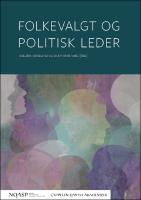Folkevalgt og politisk leder
| dc.contributor.editor | Røiseland, Asbjørn | |
| dc.contributor.editor | Vabo, Signy Irene | |
| dc.date.accessioned | 2020-06-29T12:05:54Z | |
| dc.date.available | 2020-06-29T12:05:54Z | |
| dc.date.issued | 2020 | |
| dc.identifier.uri | https://library.oapen.org/handle/20.500.12657/39904 | |
| dc.description.abstract | "The premise of Elected Officials and Political Leaders is that every elected politician is a political leader. This anthology looks at political leadership in Norwegian local governments and explores how to understand this form of leadership. Passing resolutions is an important part of an elected official’s job, and public discourse can suggest that such work is itself the essence of political leadership. This is a central concern in the book, which argues that political leadership also consists of grasping and understanding issues, setting agendas, proposing solutions and mobilizing support for them. With this broad view of political leadership, the book is organized around four paradoxes associated with the political-administrative system in Norwegian municipal government: the conflict paradox, the administration paradox, the transparency paradox and the democracy paradox. The chapters describe and discuss these paradoxes, the tensions they are based on and how opposing interests can be balanced in a constructive way, both for the local public sector as a whole as well as the individual councils and councilors. The book provides examples of how elected leaders can strengthen their political leadership, not least through a systematic comparison with Danish municipal governments. Important points in each chapter are also emphasized in interviews with political and administrative leaders who share their experiences with the authors. The book concludes with a discussion of how political leadership can be further developed and strengthened, both through changes in the institutional framework for Norwegian local governments and through dialogue and reflection within the individual municipal councils." | en_US |
| dc.language | Norwegian | en_US |
| dc.subject.classification | thema EDItEUR::J Society and Social Sciences::JP Politics and government | en_US |
| dc.subject.classification | thema EDItEUR::J Society and Social Sciences::JP Politics and government::JPH Political structure and processes::JPHL Political leaders and leadership | en_US |
| dc.subject.other | elected officials | en_US |
| dc.subject.other | political leaders | en_US |
| dc.subject.other | local government | en_US |
| dc.subject.other | Norway | en_US |
| dc.subject.other | folkevalgte | en_US |
| dc.subject.other | politisk lederskap | en_US |
| dc.subject.other | norske kommuner | en_US |
| dc.subject.other | lokalpolitiker | en_US |
| dc.subject.other | politiker | en_US |
| dc.title | Folkevalgt og politisk leder | en_US |
| dc.type | book | |
| oapen.abstract.otherlanguage | "Folkevalgt og politisk leder tar utgangspunkt i at enhver folkevalgt politiker er en politisk leder. Boken handler om politisk lederskap i norske kommuner, og den diskuterer hvordan vi kan forstå denne formen for lederskap. Å fatte beslutninger er en viktig del av folkevalgtes hverdag, og den offentlige debatten kan gi inntrykk av at dette er selve essensen i det politiske lederskapet. Boken problematiserer dette, og den argumenterer for at politisk lederskap også handler om å fange opp og forstå problemer, sette dagsorden, foreslå løsninger og skape oppslutning om disse. Med dette brede perspektivet på politisk lederskap er boken organisert rundt fire paradokser knyttet til det politisk-administrative systemet i norske kommuner: konfliktparadokset, administrasjonsparadokset, åpenhetsparadokset og demokratiparadokset. I bokens kapitler diskuteres innholdet i disse paradoksene, hvilke spenninger som ligger til grunn for dem, og hvordan motstridende hensyn kan balanseres på en konstruktiv måte, både for norsk kommunesektor som helhet, for det enkelte kommunestyret og for den enkelte folkevalgte. Boken gir eksempler på hvordan folkevalgte kan styrke sitt politiske lederskap, ikke minst basert på bokens systematiske sammenlikninger med danske kommuner. Viktige poeng i hvert kapittel blir også understreket i intervjuer med en kommunepolitiker eller en kommunedirektør som deler sine erfaringer med oss. Boken avsluttes med en diskusjon av hvordan det politiske lederskapet kan utvikles og styrkes, både gjennom endringer i rammebetingelsene for norske kommuner og gjennom diskusjoner og refleksjoner i det enkelte kommunestyret." | en_US |
| oapen.identifier.doi | 10.23865/noasp.80 | en_US |
| oapen.relation.isPublishedBy | bf7b42a4-6892-42e3-aaf8-8f32c8470a8b | en_US |
| oapen.pages | 180 | en_US |
| oapen.place.publication | Oslo | en_US |

